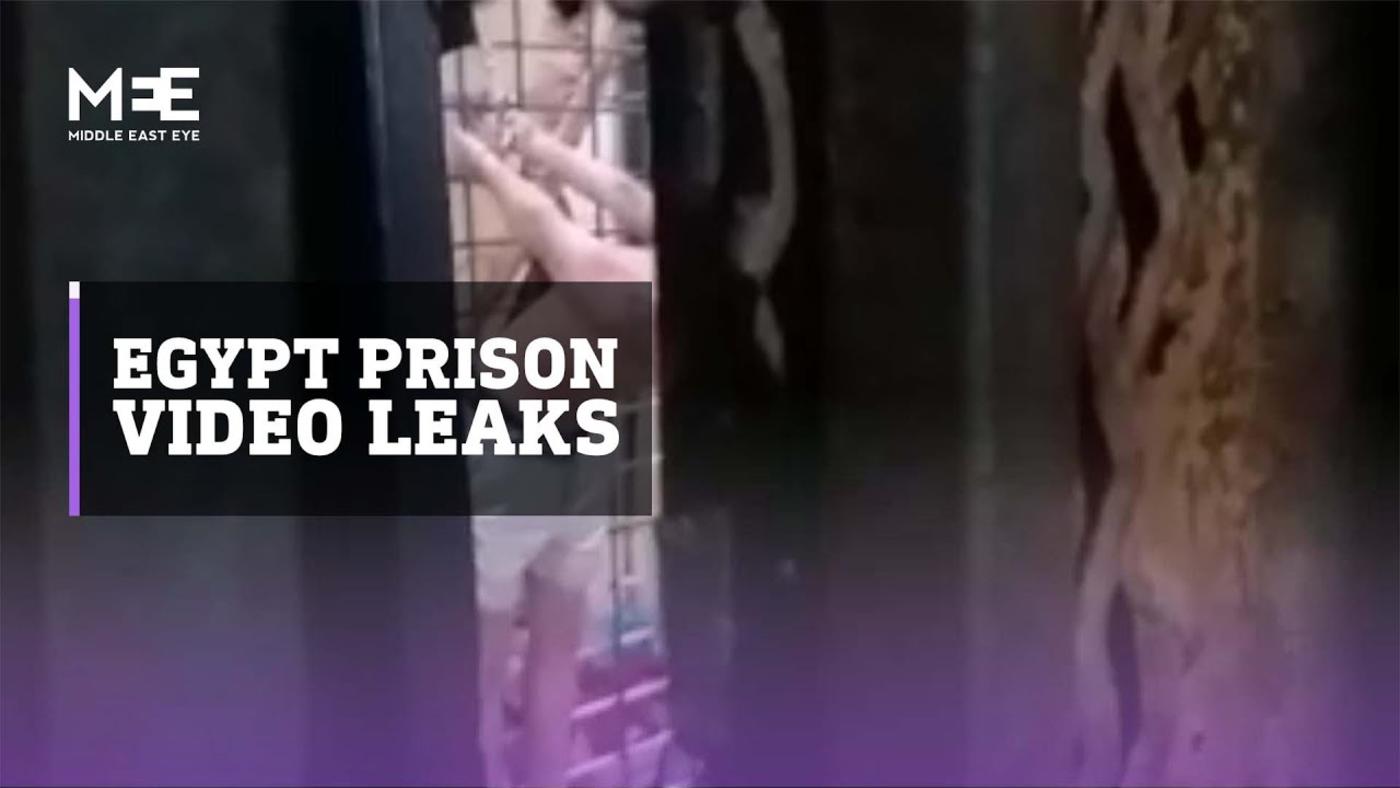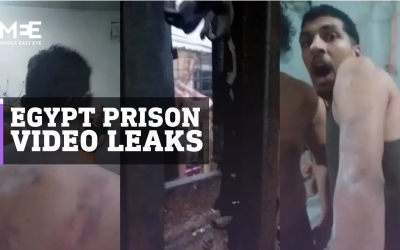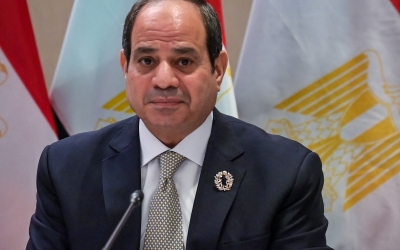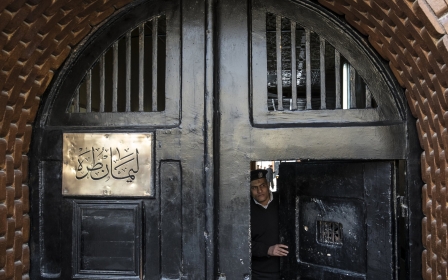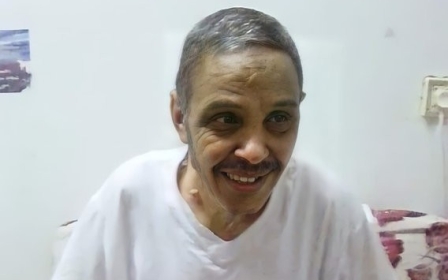Egypt: Videos appear to show inmates tortured in Cairo police station
Leaked videos seen by Middle East Eye appear to show the ill-treatment and torture of inmates by security forces in a Cairo police station, 12 years after the death of blogger Khaled Said in police custody sparked Egypt's 2011 revolution.
In one video, two men can be seen held in a stress position, hanging from their hands on a steel door with their arms tied behind their backs.
Filming secretly from a distance, two men can be heard saying "watch what the government [police] is doing to us, watch how they are torturing our mates and us" adding that the officers threatened that they would be put in a stress position next.
The videos were taken from inside al-Salam Awel Police Station, southeast of Cairo in the impoverished district of Madinat al-Salam. MEE could not confirm the time when the videos were taken.
The videos have been shared widely by Egyptian activists and Arabic media. In them, inmates queue to speak to the camera and show evidence of abuse.
MEE has edited a version of the footage, removing the most graphic scenes and protecting the identies of those seen being abused.
In the reverse hanging technique, sometimes referred to as strappado, victims are hung above the floor with their arms raised backwards behind them.
It is a form of torture that aims to inflict severe pain to the back and shoulders, sometimes causing them to be dislocated.
"Please, president,” one of the men behind the camera can be heard pleading to Egyptian President Abdel Fattah el-Sisi, “why is the police doing this to us?”
“Save us,” he repeated six times.
Egypt's interior ministry has said in the past it does not condone torture but admitted there had been "individual" cases of abuse.
Bruises
The videos were obtained by MEE through an anonymous source who says their relatives have been detained inside al-Salam Awel Police Station.
In a different video, a group of possibly 30 inmates inside a cell takes turns showing the camera wounds they allegedly suffered at the hands of police, including bruises on the face, arms and back.
"Look at this," one of the inmates says while pointing to his bleeding head and possibly broken arm. "This is the doing of the police force and investigation team of al-Salam [Awel Police Station] and their oppression."
The same inmate then adds that the detainees are crammed in one cell and cannot breathe fresh air. He says they have not been given food.
The camera then pans around the cell showing the inmates, who are mostly in their underwear, pleading for help and naming the officers who allegedly assaulted them.
One man points to two possibly unconscious men lying on the ground: "Here, there is a dying man! And here is another one."
"This is the doing of the government [police] which say they are protecting us while they are torturing us," he adds.
In impoverished Egyptian neighbourhoods, civilians call the police "the government", signifying that law enforcement is the only governmental presence in these working-class areas.
The speaker also points to two middle-aged men: "They [the officers] beat the teeth out of this man who is old enough to be their father."
A number of the detained men accused the police station's investigation bureau and other officers of pinning on them cold cases that have not been solved.
The Egyptian police are infamous for such techniques, where illegally detained civilians can be charged with crimes they have never committed such as violence, theft or drug trafficking.
One of the men said that he worked as an informant for the police for five years, but now he is also in detention.
'Unsettled vendetta'
The inmates from the videos name three police officers who are behind the assaults: Ahmed Badawi, Ali al-Kasab and Amro Ezzat.
MEE confirmed that all three are active police captains working in the station's investigation bureau.
Badawi denied the allegations to MEE, describing them as "fabrications by the Muslim Brotherhood", an opposition group that has been outlawed since Egypt's 2013 military coup.
Kassab refused to comment, threatening to arrest the reporter.
MEE's repeated calls to Ezzat's phone were left unanswered.
The work numbers of the police officers are often printed on the walls of shops and markets to encourage civilians to report crimes.
Ismail, one al-Salam resident, told MEE that Badawi is known for his temper and for "turning the police station into a slaughterhouse", pointing to several reported incidents of torture.
“They are all well-off people from wealthy families, but they thrive to humiliate working and impoverished people like us,” Ismail said.
In January 2019, a different video also taken from the detention cell of al-Salam Awel Police Station showed more than 50 inmates crammed in a small space, with difficulty breathing and no sanitary bathrooms.
The video also shows inmates with signs of torture. Although the video was widely shared, no investigation into the footage took place.
The source who leaked the latest video to MEE said that their uncle was arrested in September 2021 over an argument with a lower-ranking police officer over a trivial matter that MEE is not revealing to protect their identity.
"He has been imprisoned in al-Salam police station for over four months now, and we have to bribe our way to smuggle food and medicine to him," the source said.
Because the arresting officer knew officials in the investigation bureau, the man was charged with a narcotics trafficking case, the source added.
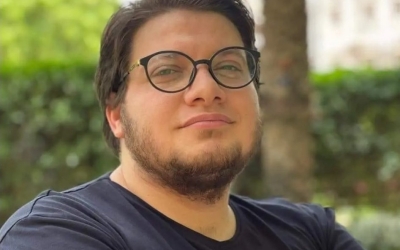
A member of the state-controlled National Council for Human Rights (NCHR) told MEE on condition of anonymity that he cannot confirm or deny the incidents in these particular videos. But he added that "the bad treatment of inmates, especially ones accused of criminal activity and police informants in slums and working-class areas, have been on the rise".
This month marks the 11th anniversary of the Egyptian revolution, which among other things was sparked by the death of Khaled Said at the hands of police in 2010.
During the early days of the 18-day protests, which toppled longtime autocrat Hosni Mubarak, police stations were attacked and looted, forcing many policemen to take off their uniforms and abandon their posts to avoid assaults.
Most of the violence and humiliation that the police were subjected to took place in poor areas, the NCHR official explains, "which has left an unsettled vendetta between them [the police] and the poor classes".
Egypt has tried and sentenced several police officers for violent deaths in detention in recent years. However, such trials only occur if the incidents are exposed publicly and lead to widespread anger and protests.
Reports of torture
Dozens of leaked videos of mistreatment of prisoners and inmates in Egyptian detention facilities have surfaced on the internet since 2008 and the usage of phone cameras.
Rarely does this footage get investigated by the authorities. In many cases, pro-government politicians and media outlets describe the videos as fabricated material aimed at criticising the government.
In the first 11 months of 2021, Egypt's Nadeem Centre for the Rehabilitation of Torture Victims documented around 93 incidents of torture in police detention, along with 54 deaths in police custody.
'Egypt's security forces act with impunity, routinely conducting arbitrary arrests, enforced disappearances, and torture of real or suspected political activists as well as ordinary citizens'
- Human Rights Watch
Human Rights Watch (HRW) said in its World Report 2022 that "Egypt's security forces act with impunity, routinely conducting arbitrary arrests, enforced disappearances, and torture of real or suspected political activists as well as ordinary citizens".
The watchdog criticised the country's "superficial attempts to create an impression of human rights progress".
Propaganda videos often accompany human rights delegations to Egyptian prisons, showing no signs of ill-treatment and arguing that prisoners have good facilities and luxuries.
"Once they know that we are coming to investigate the prison, they will hide all the injured prisoners and exhibit the football pitch and food courts," the NCHR official told MEE.
The issue of torture in Egypt has been under the international spotlight since an Italian parliamentary panel accused the Egyptian security apparatus of the kidnapping, torture and murder of Italian student Giulio Regeni in Cairo in 2016. A post-mortem examination showed he had been tortured before his death.
"Responsibility...lies directly with the security apparatus of the Arab Republic of Egypt, in particular with officials of the National Security Agency (NSA)," the final report of the cross-party parliamentary committee said.
The Egyptian police denies any involvement in the killing.
Middle East Eye delivers independent and unrivalled coverage and analysis of the Middle East, North Africa and beyond. To learn more about republishing this content and the associated fees, please fill out this form. More about MEE can be found here.


